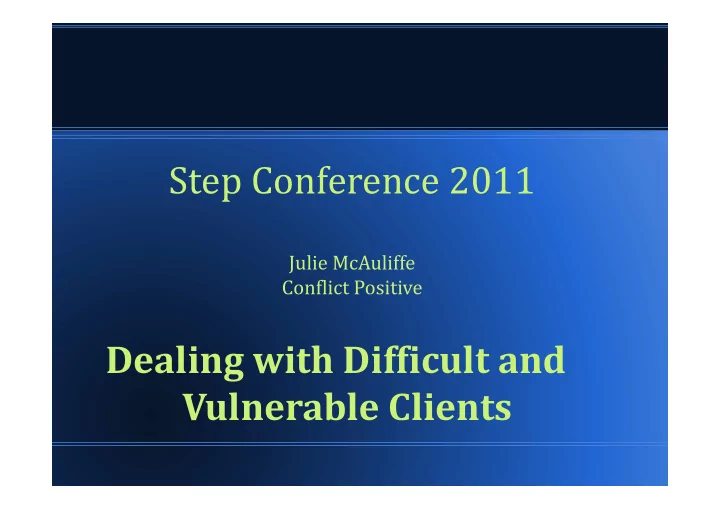

Step Conference 2011 Julie McAuliffe Conflict Positive Dealing with Difficult and Vulnerable Clients
Who is a Difficult or Vulnerable Client 1. A client anticipating death and drawing up a will, who as a result might be indecisive, troubled, and fearful. • 2. A client who is in a dispute with another person due to the terms of a will, and as a result might be angry vengeful and fearful. And m ay also be grieving the loss of a family member.
Grief and Loss • Bereavement is a time of great emotional pain, stress and adjustment for many people. • Grief is the emotional response caused by any loss. • Anticipatory Grief occurs before death for the person and for those who will mourn them. • Normal Grief : Mind/Emotional/ Physical/ Spiritual response • Each person grieves in their own way. • Responses range from normal to a chronic grief response.
Elisabeth Kubler –Ross 5 Stages of Grief Five Stages of Grief Denial : conscious /unconscious inability to accept facts, information, reality . Anger : upset /angry with themselves with others close to them. Bargaining : For those facing death Depression : natural sadness regret uncertainty, fear. Acceptance : Emotional detachment and objectivity . On death and Dying , Elasbeth Kubler Ross 1969
Grief : Emotions & Decisions Emotions and Decisions The person may be more reactive, defensive, intense or disconnected than at other times. Concentration can be poor and making decisions difficult during this period. Studies Show In normal grief the most intense reactions are experienced in the first 1st six months Men find grieving harder than women
What can you do if your client is grieving ? Good Practice 1. Prepare in advance: your client may be mildly or intensely angry, distressed, distant. 2. Don’t follow your natural reaction: To ignore this/switch off • • To go into battle with your client • To become irritated, or ultra professional and business like
What can you do if your client is grieving ? CLER Good practice continued 4. Can your client control their emotions, assess their options, and work with you? if this is a struggle then c hange your approach Move into CLER Make a human Connection, Listen to understand what is important to your client, then Empathically Respond.
Return to your Professional Role Move into CLER Being treated as an individual, being encouraged to give voice to issues that have importance and meaning for us, being understood, and feeling we have autonomony helps all of us to settle and become more collaborative. Move out of CLER Remind your client of the boundaries of your professional role.
Reactions to Interpersonal Conflict Definition When another person crosses an important boundary line and undermines or threatens us in areas that are of high importance to us such as our sence of identity or who we are, the values we hold dear and try to live by, or our basic survival or social needs, then this calls forth a conflict reaction. ( Cinnie Nobel Conflict Coach ) Biological Response to Threat Maslows Hierarchy of Basic Needs S.C.A.R.F. Model of Social Needs Personal Conflict Style Preference Thomas and Kilman (handout ) Model of Conflict Escalation/De-escalation
What if your client is very angry and or unwilling to cooperate with you ? Consciously remain calm but approachable. Resist responding in a way that will cause your client to escalate the conflict with you, or shut down, by your attitude and the language you use . Follow steps 1 - 4 in slides six and seven If you have been able to listen to understand the person he /she will be calmer, and more willing to work with you. You will find out what is important to them in this dispute, it is often not what clients first present with. From this information you will both be able to assess what the best format for this fight might be.
Recommend
More recommend